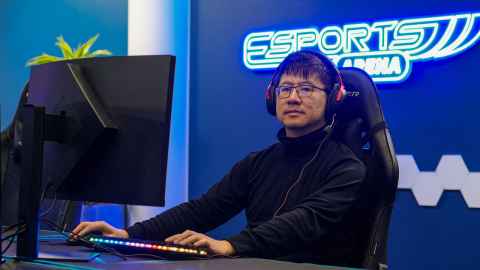From esports arenas to workplaces, rivalry may be the secret to successful teams, research on millions of gamers suggests.
As Saudi Arabia kicks off the 2025 Esports World Cup with a US $70 million prize pool and an opening-night concert by Post Malone, researcher Dr Kenny Ching (University of Auckland) says the most successful squads may well be built on past rivalries.
By analysing esports teams, Ching and co-authors Enrico Forti (Manhattan College) and Evan Rawley (University of Connecticut) find that people who've competed against each other in the past make better teammates in the future.
Their study evaluates millions of randomly formed teams in the global multiplayer game Defense of the Ancients 2 (DOTA 2).
Players in DOTA 2 are frequently reshuffled into new teams, offering the chance to measure how different team compositions influence success, says Ching, an avid gamer himself.
"Defense of the Ancients is a high-pressure game where two teams of five players battle head-to-head.
"With millions of active players and a professional circuit that sells out stadiums, it's one of the most competitive and team-oriented games in the esports world."

The large-scale study finds that teammates who've competed against one another in the past, gaining what the researchers call 'competitive familiarity', perform significantly better than those who haven't.
So why might past rivalry make for better teamwork?
Ching says competition, especially high-stakes public competition, offers insights into how people think, react, and strategise.
"When those same individuals become teammates, those insights can be used to improve coordination and decision-making.
"Competing against a person builds familiarity. Things that might be overlooked when on the same team might be more clearly noticed and remembered during competition."
One professional player quoted in the study, Su 'Super' Peng, described how competition helped him "feel" his opponent's style of play, allowing for a deeper understanding once they were on the same team.
"Competitive familiarity is surprisingly common in organisational life," says Ching. "It happens when companies merge, poach talent from competitors, or bring rival teams together for product development."
Real-world examples where organisations harness rivalry to drive innovation and learning include Samsung, where competition between some internal teams is encouraged before bringing them together to develop new products.
Cybersecurity and tech companies sometimes form 'red teams' of internal contrarians who mimic rival attackers to identify weaknesses. And sports teams frequently pay big bucks to bring former adversaries into the fold.
Ching's paper, published in Organization Science, includes a few ideas to harness the benefits of competition: Rotating employees through competing teams, staging internal competitions and encouraging former rivals to co-lead projects.
"Esports provides a unique lens into how teams form, adapt and compete under pressure," he says. "Just as people learn to work better together through collaboration, they can also learn and have better outcomes through competition."






